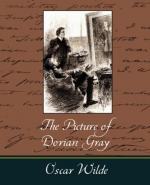Cloudless, and pierced by one solitary star, a copper-green sky gleamed through the windows. He read on by its wan light till he could read no more. Then, after his valet had reminded him several times of the lateness of the hour, he got up, and, going into the next room, placed the book on the little Florentine table that always stood at his bedside, and began to dress for dinner.
It was almost nine o’clock before he reached the club, where he found Lord Henry sitting alone, in the morning-room, looking very bored.
“I am so sorry, Harry,” he cried, “but really it is entirely your fault. That book you sent me so fascinated me that I forgot what the time was.”
“I thought you would like it,” replied his host, rising from his chair.
“I didn’t say I liked it, Harry. I said it fascinated me. There is a great difference.”
“Ah, if you have discovered that, you have discovered a great deal,” murmured Lord Henry, with his curious smile. “Come, let us go in to dinner. It is dreadfully late, and I am afraid the champagne will be too much iced.”
CHAPTER IX
[65] For years, Dorian Gray could not free himself from the memory of this book. Or perhaps it would be more accurate to say that he never sought to free himself from it. He procured from Paris no less than five large-paper copies of the first edition, and had them bound in different colors, so that they might suit his various moods and the changing fancies of a nature over which he seemed, at times, to have almost entirely lost control. The hero, the wonderful young Parisian, in whom the romantic temperament and the scientific temperament were so strangely blended, became to him a kind of prefiguring type of himself. And, indeed, the whole book seemed to him to contain the story of his own life, written before he had lived it.
In one point he was more fortunate than the book’s fantastic hero. He never knew—never, indeed, had any cause to know—that somewhat grotesque dread of mirrors, and polished metal surfaces, and still water, which came upon the young Parisian so early in his life, and was occasioned by the sudden decay of a beauty that had once, apparently, been so remarkable. It was with an almost cruel joy—and perhaps in nearly every joy, as certainly in every pleasure, cruelty has its place—that he used to read the latter part of the book, with its really tragic, if somewhat over-emphasized, account of the sorrow and despair of one who had himself lost what in others, and in the world, he had most valued.




